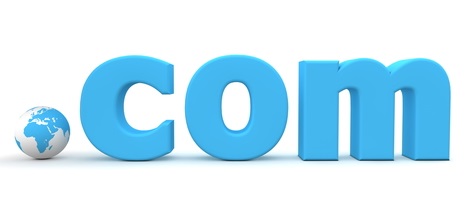Search for your domain name
.COM Domain Name Only $8.99
Unveiled in January 1985, the .com extension was one of the very first Top-Level Domains (TLD) and has since grown to become the world’s most popular. Dozens of other TLDs are now available, but no matter how many new extensions get added, everyone agrees — .com domains are still the world’s most popular.
When you register .com, it puts you right next to some of the internet’s most established brands, as it’s been there since the start of the internet. Short as dot com sounds, it can speak volumes about your credibility and go a long way in building confidence that you aren’t a fly-by-night operation — you’re here for the long run.
The .com domain: A reputation established over time.
Back when the internet was just beginning to transition from science fiction to everyday use, .com domain names were among the first TLDs replacing strings of numbers that had served as web addresses.

In 1985, a computer manufacturer in Massachusetts registered the first .com domain. By the end of that year, there were a total of six domains registered worldwide (compared with the hundreds of millions today).
Originally created to designate commercial entities, by the mid-1990s there were no restrictions to register .com and before long it was used for all types of online endeavors. Today when you look at the most expensive TLDs in the world, .com domain names top the list — with many of them valued upward of $10 million. Most of us don’t have that kind of cash laying around, but a carefully chosen .com (no matter its cost) can still have a heavyweight impact.
What else can a .com domain do?
Compared to the days when .com launched, there are hundreds more options for setting up an online presence. But even with all the new choices, people buy .com over others for a number of solid reasons. A .com domain:
- Gives you credibility in the online world. It’s the go-to for anyone looking to establish themselves on the web.
- Can be purchased by anyone. Although initially intended for businesses, there are no restrictions on who can register a .com.
- Is extremely versatile. Some domains suggest something specific, but .com can work for any type of website.
Register .com to protect your brand.
According to Verisign, the registry handling .com domains, this TLD accounts for nearly a third of the more than 335 million domains (and growing) registered today. Registrations for the two most common domains, .com and .net, alone will gain millions of new registrations each year. With .com touching nearly everything imaginable online, it’s a good idea to protect your brand.
Even if you go with another TLD, registering .com domains with common misspellings of your website address will keep others from misdirecting your traffic to their sites. Best of all, you don’t need to have a separate site for each domain — you can just have them redirect visitors to your primary .com site.
Don’t let your .com domain name get away.
While it’s a fact that millions of .com domains have already been registered, there’s still lots of potential in this popular domain extension. It’s very possible there’s a creative alternate way to brand yourself with dot com. If not, perhaps someone is done using a .com domain name that would be perfect for you and it’s back on the open market. Or maybe your idea is so awesome that nobody has thought of it before. When you find the perfect .com, make sure you grab it fast.
Problems with Getting a Dot Com Domain
These are all very good reasons to stick with dot com domains. But of course there are difficulties to go with these.
Good dot com domains are very hard to find. You would be lucky indeed to find a two-word (that is dictionary words) domain that’s still free. And still even luckier if you can find a single-word domain that’s appealing and recognizable in your language. Most excellent, “premium” domains are either taken up or for sale– at very high prices. Unless you have the money or want a particular domain very badly, you don’t want to go that route.
Often to get a dot com domain close to what you originally wanted, you’d have to add an extra word or two or a hyphen to the name. For example, if you first wanted “word.com” but it’s already taken, you might try “my-word.com” or “myeasywordlookup.com.” Yet this results in a long and/or awkward name which can offset the benefits having a .com domain brings.
Sometimes a dot com domain may not fit what your website is about. If you’re making a website about for a non-profit organization or a government body, then .org or .gov would be more appropriate. If you are targeting a specific part of the world, it makes sense to get a country-specific TLD instead such as .co.uk or .com.ph.
